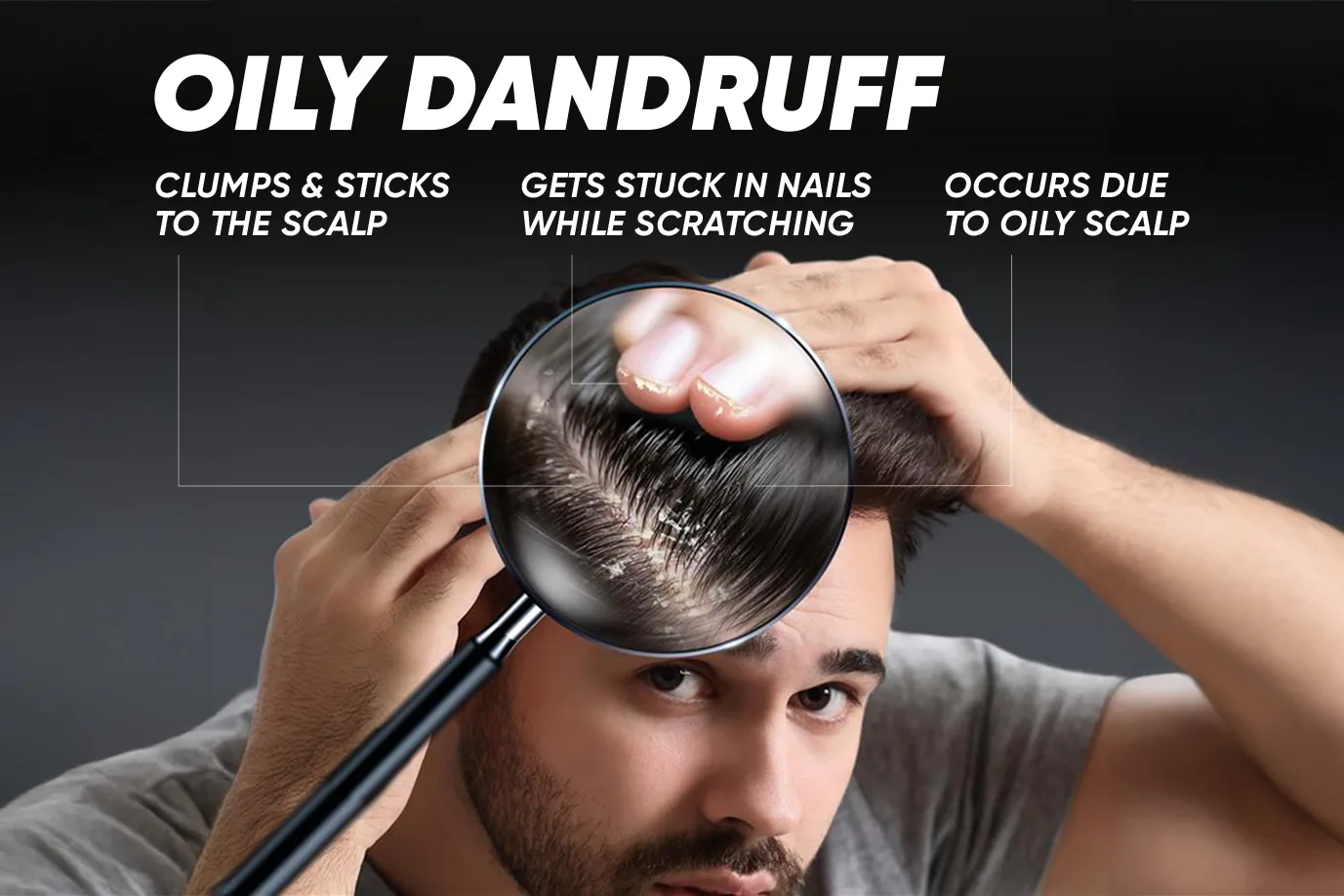What Is Oily Dandruff and How Head & Shoulders Deep Cleanse Shampoo Helps You Get Rid of It

Dry and flaky dandruff affects most of us and can be triggered by several dandruff-causing factors, like a lack of moisture on the scalp, a new shampoo or a change in weather. Thankfully, there is no dearth of anti-dandruff shampoos in the market aiming to deal with those pesky white flakes. However, there is another, less talked about, type of dandruff that can be equally, if not more, bothersome - oily, sticky dandruff.
Have you ever scratched your scalp and noticed yellowish, gooey flakes stuck to your nails? That’s oily dandruff! This type of dandruff doesn’t usually make itself evident on your shoulders, but sticks to your hair and forms clumps on the scalp.
When it comes to achieving that gorgeous, healthy hair we all crave, sticky, oily dandruff can be frustrating to get rid of. You know the drill: the constant itch, greasy scalp, and that annoying residue that just won’t let go of your hair and scalp. If this sounds all too familiar, you’re definitely not alone. Let’s dive into the mysteries of this common scalp issue and introduce you to a reliable solution: Head & Shoulders Deep Cleanse Shampoo. Here’s your guide on understanding oily dandruff and learning how to tackle it with one of the most trusted brands in anti-dandruff hair care.
What is Oily Dandruff and What Causes It?
Oily dandruff, also known as seborrheic dermatitis, is a scalp condition that results from an excess production of natural oils, or sebum, combined with an overgrowth of yeast. This yeast, a type called Malassezia, thrives on the oil naturally produced by your scalp. When factors like genetics, stress, humidity, or sweat lead to an abundance of these oils, Malassezia can proliferate, triggering an immune response. This response manifests as the familiar flaking, itching, and irritation associated with oily dandruff.
Seborrheic dermatitis can lead to an overproduction of skin cells and an increase in sebum production. This results in a sticky buildup of excess oil and skin cells on the scalp, which causes discomfort and tenderness. Sometimes, this oily dandruff can spread beyond the scalp, affecting the forehead or even leading to hair thinning. Understanding the root of the problem is key to tackling it, and with the right approach, you can get rid of oily scalp and dandruff for good.
How to know if you have oily dandruff?
● Your scalp feels oily and sticky
● The flakes are greasy. They are clumped to the scalp and get stuck in your nails when you scratch
● The flakes are larger in size
● The flakes can be yellow or white in colour.
How to Manage Oily Dandruff with an Effective Hair Care Routine
Dealing with oily dandruff can feel like an endless struggle, but with the right strategies and products, you can take charge of your scalp health. Here’s a guide to effectively managing oily dandruff:
1. Tap into the Purifying Power of Active Ingredients
One of the best ways to combat oily scalp and dandruff is by using a shampoo that’s packed with purifying agents. Oxygenated charcoal is a fantastic option, as it pulls out impurities and soaks up excess oil that can lead to dandruff. This ingredient works wonders in clearing away the stubborn flakes that are caused due to an oily scalp.
2. Tackle Dandruff-Causing Microbes
In addition to purifying the scalp, it's crucial to address the root cause of dandruff. Look out for shampoos that contain active ingredients like Piroctone Olamine, which specifically target the microbes that cause dandruff. Head and Shoulders Deep Cleanse Shampoo is the number 1 choice of dermatologists* for oily dandruff as it packs the goodness of oxygenated charcoal as well as Piroctone Olamine. It effectively tackles oily, sticky dandruff by targeting it at the root, even the kind that sticks to the scalp. Regular use of this shampoo can significantly control oily dandruff and even prevent it from coming back.
3. Enjoy an Invigorating Freshness
A shampoo that not only cleans but also refreshes the scalp is perfect for managing oily dandruff. Look for an anti-dandruff shampoo that features fresh menthol scents, leaving your hair and scalp feeling refreshed and energised. With the fragrance of fresh menthol leaves, the Head & Shoulders Deep Cleanse shampoo adds a nice boost of freshness to your hair care routine.
4. Stay Consistent
To keep your scalp healthy and prevent dandruff from recurring, regular shampooing is crucial. Using a specialised anti-dandruff shampoo at least three times a week allows the active ingredients to work their magic. When used regularly, the Head & Shoulders Deep Cleanse Shampoo ensures up to 100% protection from oily sticky dandruff** and prevents it from coming back.
Additional Tips to Prevent Oily Dandruff
● Limit Styling Tools: Reduce the use of heat styling to prevent excess oil production and scalp irritation.
● Use a Scalp Scrub: Regularly exfoliate your scalp to remove dead skin cells and excess oils.
● Opt for Loose Hairstyles: Allow your scalp to breathe with looser hairstyles to improve circulation.
● Include Healthy Fats in Your Diet: Omega-3 fatty acids can enhance scalp and skin health.
● Stay Hydrated: Drinking water supports hydration, reducing flaking.
● Choose Gentle Hair Accessories: Use brushes and accessories made from natural materials to minimise irritation.
● Clean Your Tools Regularly: Ensure brushes and combs are clean to avoid oil buildup.
Conclusion
Dealing with oily scalp and sticky dandruff can feel like a daunting task, but it doesn’t have to be! By making a few thoughtful changes to your routine—like using a Head and Shoulders Deep Cleanse Shampoo —you can maintain your scalp health and get rid of those pesky flakes. Every little adjustment you make brings you closer to the balanced scalp you’re dreaming of. So, take these steps with a bit of patience and consistency, and you’ll soon be able to flaunt hair that’s not just dandruff-free but also lively and vibrant.
*As surveyed with Dermatologists aware of Head & Shoulders at 2023 world congress of Dermatology, Singapore.
**Only Visible Flakes. With regular use of at least 3 times a week.



